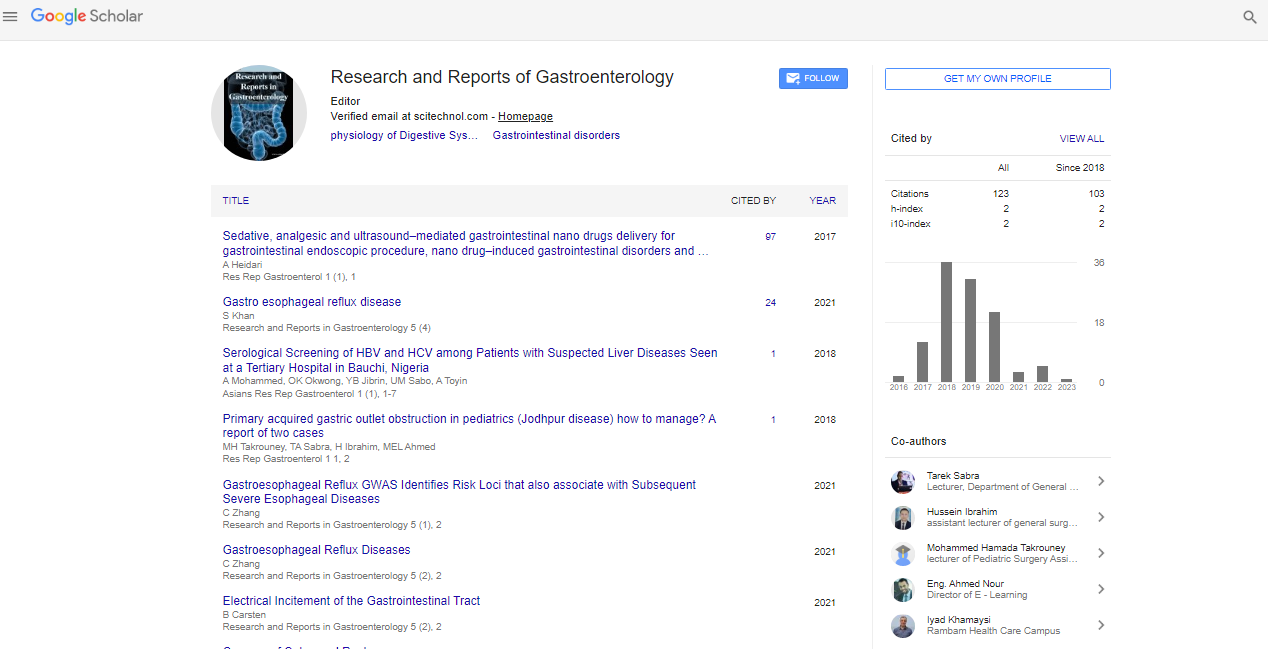Opinion Article, Res Rep Gastroenterol Vol: 7 Issue: 4
A Comprehensive Exploration of Esophageal Disorders
Jonathan Opitz*
1Department of Surgery and Transplantation, University Hospital Zurich, Zurich, Switzerland
*Corresponding Author: Jonathan Opitz,
Department of Surgery and
Transplantation, University Hospital Zurich, Zurich, Switzerland
E-mail: opitzjonathan@gmail.com
Received date: 20 November, 2023 Manuscript No. RRG-24-124059;
Editor assigned date: 22 November, 2023, PreQC No. RRG-24-124059 (PQ);
Reviewed date: 06 December, 2023, QC No. RRG-24-124059;
Revised date: 13 December, 2023, Manuscript No. RRG-24-124059 (R);
Published date: 20 December, 2023, DOI: 10.4172/Rrg.1000157
Citation: Opitz J (2023) A Comprehensive Exploration of Esophageal Disorders. Res Rep Gastroenterol 7:4.
Description
The esophagus, a muscular tube connecting the throat to the stomach, is a crucial component of the digestive system. When functioning properly, it allows for the seamless passage of food and liquids. However, a spectrum of disorders can affect the esophagus, leading to a range of symptoms and complications.
Common Esophageal Disorders
Gastroesophageal Reflux Disease (GERD) is a prevalent esophageal disorder characterized by the backward flow of stomach acid into the esophagus. Persistent acid reflux can lead to irritation, inflammation, and damage to the esophageal lining, causing symptoms such as heartburn, regurgitation, and difficulty swallowing. Lifestyle modifications, medications, and in severe cases, surgical intervention may be employed to manage GERD.
Esophageal motility disorders affecting the normal contractions of the esophagus fall under the category of esophageal motility disorders. Achalasia, for example, is a disorder where the lower esophageal sphincter fails to relax, impeding the passage of food into the stomach. Treatments may include medications, dilation procedures, or surgical interventions to alleviate symptoms.
Esophageal strictures involve the narrowing of the esophagus, making it difficult for food to pass through. Strictures can result from chronic inflammation, GERD, or the ingestion of corrosive substances. Treatment options may include dilation procedures to widen the esophagus and address the underlying cause.
Barrett's esophagus is a condition in which the normal lining of the esophagus is replaced by tissue similar to the lining of the intestine. It is often associated with long-term GERD and is considered a precursor to esophageal cancer. Regular monitoring and treatment of GERD are crucial in managing Barrett's esophagus.
Esophageal cancer is a serious and often aggressive disease. Adenocarcinoma and squamous cell carcinoma are the two main types of esophageal cancer. Risk factors include chronic GERD, smoking, excessive alcohol consumption, and obesity. Treatment options vary depending on the stage of cancer but may include surgery, chemotherapy, and radiation therapy.
Symptoms and presentation
Esophageal disorders can manifest with a variety of symptoms, and the specific presentation often depends on the nature of the underlying condition. Common symptoms include:
• A burning sensation in the chest, often indicative of GERD.
• Difficulty swallowing, which may be associated with motility disorders, strictures, or cancer.
• The backflow of stomach contents into the throat.
• While not exclusive to esophageal disorders, chest pain can be a symptom, particularly in conditions like GERD.
• Common in more advanced cases, such as esophageal cancer.
The diverse spectrum of esophageal disorders underscores the importance of early diagnosis and tailored management strategies. Advances in diagnostic technologies and treatment modalities have enhanced our ability to understand and address these conditions. From lifestyle modifications and medications to endoscopic interventions and surgery, the armamentarium for managing esophageal disorders continues to evolve. As our understanding deepens, so does the hope for improved outcomes and enhanced quality of life for individuals grappling with the complexities of esophageal health.
 Spanish
Spanish  Chinese
Chinese  Russian
Russian  German
German  French
French  Japanese
Japanese  Portuguese
Portuguese  Hindi
Hindi 